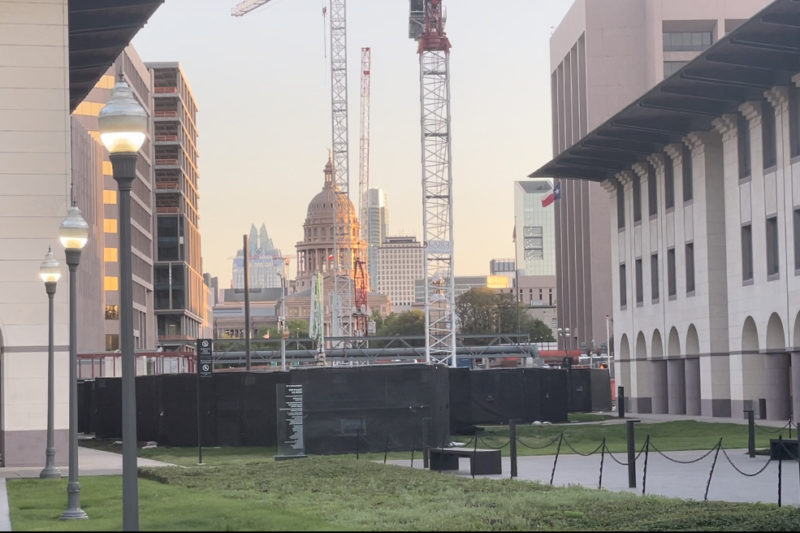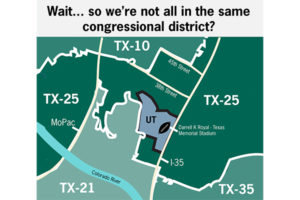Texas Redistricting Prompts Gerrymandering Concerns
By Clark Dalton
Reporting Texas TV
AUSTIN, Texas — As a result of the 2020 census, Texas gained two congressional seats due to its population growth.
The state will have 38 seats in the House of Representatives in the 2022 election and 40 electoral votes for the 2024 presidential election. New York and California each lost one seat and one elector. The Texas Legislature will redraw congressional district maps in a process known as redistricting.
MOVE Texas, a non-partisan dedicated to increasing civic engagement, said redistricting is how the state sets power for the next 10 years.
“(It determines) who gets political power, congressional representation, or state house representation, so it’s critical to be knowledgeable about this process,” said Charlie Bonner, Move Texas’s communications director.

Redistricting in 2021 will keep splits in downtown Austin, including four different districts in close proximity to the campus of the University of Texas. (Photo: Clark Dalton)
Redistricting can predetermine elected officials if gerrymandering gets in the way.
Gerrymandering is when a political party draws districts to favor them in elections. Sometimes legislators create districts that give them an edge.
The Republican Party has held the majority in both chambers of the state legislature since 2002. Bonner said Republicans have taken advantage of gerrymandered districts.
“In a state like Texas that’s controlled by one party levers of government, they have an outsized impact on those districts,” Bonner said.
“We start to have a system where elected officials are choosing voters, not voters choosing elected officials.”
That is the main goal of gerrymandering.
Both major political parties have gerrymandered, but a recent article from The Guardian reported that Republican-majority states like Texas plan aggressive redistricting strategies to sway seats in their favor.
The area surrounding the campus of the University of Texas at Austin is split into four different districts. East of Interstate 35, Seventh Street divides the 25th and 35th congressional districts. Driving west on Seventh Street to the other side of the interstate takes you into the 21st district.

This map from The Daily Texan shows the location of four districts in downtown Austin. (Graphic: Megan Fletcher )
Multiple districts in the neighborhoods around campus means college-age voters don’t have a single representative to voice their collective concerns. This year’s redistricting is unlikely to change that.
Residents in large cities like Austin and Dallas are most likely to be impacted. Republican lawmakers could draw districts that combine metropolitan voters with rural areas who vote more conservatively. Urban areas have more non-white voters than rural areas.
“We can’t have districts stretching between two major cities,” University Democrats representative John Kelly said.
“It doesn’t make sense. I have the same representative as a person in Bastrop or La Grange, and we might not share the same views.”
The Supreme Court ruled in 2013 that the criteria for the 1965 Voting Rights Act were outdated. As a result, majority-minority districts like District 15 in San Antonio could be torn apart.
Jolt, a Latinx advocacy group dedicated to increasing civic engagement among Latinos and Hispanics, said it plans to fight if state lawmakers try to draw district lines in an unfair manner.
“We all on the ground know our communities a lot better than the people on the redistricting committee,” said Macy Miranda, Jolt’s communications director.
“We’ve had a redistricting task force with Mexican American Legal Defense [and Educational] Fund and the Texas Civil Rights Project.”
Miranda said the organization’s immediate goal is to push voters to educate themselves and badger their representatives. She said Jolt is targeting Texas’s Hispanic population, which grew by two million over the last decade.
“It’s important that [the redistricting committee] vote with their conscience and realize the impact they have is going to be for the next 10 years,” Miranda said.
“[Redistricting] could be detrimental to some communities. What’s right is drawing maps that accurately represent the community, so they can have their needs met when they go to vote.”
You can locate your congressional district by visiting the United States House of Representatives website.